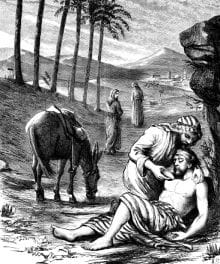By: Joe Plemon, crosswalk.com
England’s former Prime Minister Margaret Thatcher once observed, “No one would remember the Good Samaritan if he’d only had good intentions – he had money too.” Of course the Good Samaritan was not an actual historical figure; he was a fictional man in a story that Jesus told to a religious legalist who was trying to justify his unwillingness to walk the walk. The story goes like this:
Here are 5 Lessons we can learn from the Good Samaritan Story
1. The good samaritan was willing to get involved.
We may quote scripture and recite platitudes on love and God, but unless we are willing to get involved in the lives of others, we are only blowing smoke. The Samaritan treated and bandaged the wounds. He set the injured man on his donkey. He took him to an inn and cared for him throughout the night. The Samaritan could have said to himself, “I give regularly to my church. I donate to the Salvation Army every Christmas. I have done my part.” But he didn’t. As the scriptures say, he had compassion…and he acted on it.
2. The good samaritan ignored racism.
Even though he was considered a “despised Samaritan,” he rose above such shallowness to care for a fellow human being. I compare the Samaritan’s actions to an American 19th century slave showing compassion to a plantation owner or a Jewish prisoner demonstrating concern for a Nazi guard during WWII.
3. The good samaritan had money.
Margaret Thatcher was absolutely spot on: this was a man who managed his money. He undoubtedly lived on a budget, spent less than he made and maintained a contingency fund for unexpected expenses. My wife and I fully realize that we need to be very intentional if we are going to have such a giving fund, so we place cash into a “bless envelope” every month. Knowing that money is there has raised our antennae to the needs around us.
4. The good samaritan had a good name.
One wonders if the Samaritan had been to that inn before, perhaps paying for some other needy person’s stay. We know this: the innkeeper trusted the Samaritan, probably because he had proven himself to be trustworthy.
5. The good samaritan was generous.
The Samaritan didn’t know how long the injured man would be laid up, but I am guessing (because the text said the attack left him “half dead”), that it could be a prolonged stay. At any rate, the wellbeing of this stranger was more important to our Good Samaritan than whatever the cost might be. Again, this generosity would never have been possible if he hadn’t had money in the first place.
The central message of this story is that, if we are to be good neighbors, we need to be more like the Samaritan. The implied message is to get strong financially and stay strong financially so we can have the means to act on our good intentions.
Jesus concludes with this admonition, “Go and do likewise.” When we learn this lesson, we, and the world around us, will be better for it.
How will you follow Jesus’ challenge to “Go and do likewise”? What additional lessons from the Good Samaritan can you think of? Leave your thoughts in the comments below!

No comments:
Post a Comment
Thank you for visiting Simposious.blogspot.com We welcome your comments.